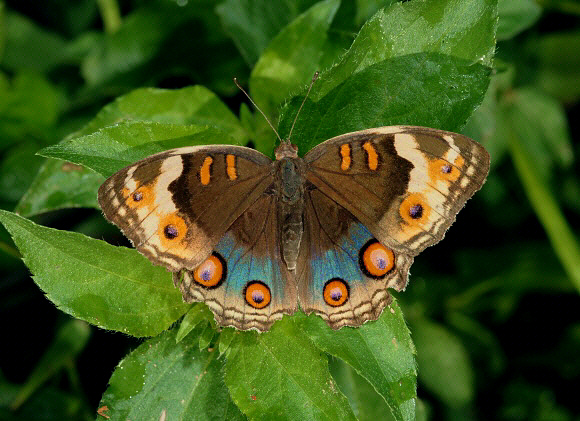Introduction
The genus Junonia comprises about 33 species, of which 11 occur in the Oriental region. Of these, 6 are found on the Indian subcontinent: iphita, atlites, orithya, hierta, almana and lemonias.
Junonia orithya is typical of the genus, being brightly marked with blue and orange, and possessing prominent ocelli. It is a fairly common butterfly, although never as abundant as its duller relatives iphita and atlites.
Junonia orithya is found in sub-Saharan Africa, Arabia, and over most of the Oriental and Australian regions.

Habitats
This species, like most others in the genus, is found mainly in open and disturbed situations such as along roadsides, on farmland, in quarries and in open grassy forest clearings. In India it is found at elevations between sea level and about 1800m.
Lifecycle
The green, barrel-shaped egg is laid singly on the underside of leaves of the foodplants. The larva when fully grown is black with minute yellow spots and covered in short multi-branched spines. The head is orange, with a pair of short black spines. It feeds on the foliage of many herbaceous plants including Justicia, Hypoestes, Lepidagathis, Thunbergia, Rostellularia, Hygrophila, Pseuderanthenum (Acanthaceae), Convolvulus, Ipomoea (Convolvulaceae), Angelonia (Scrophulariaceae), Lippia (Verbenaceae), Buchnera (Orobanchaceae), Plantago and Antirrhinum (Plantaginaceae). The chrysalis is brown, mottled with greyish, and has yellowish-brown wing cases. The back is studded with tiny thorn-like tubercules. It is suspended by the cremaster from dry stems.
Adult behaviour
Blue Pansies fly swiftly, usually over short distances, interspersed with short periods spent basking on the ground or on foliage, at which time they usually hold their wings fully outspread. Both sexes nectar at a wide variety of wild or cultivated flowers.
